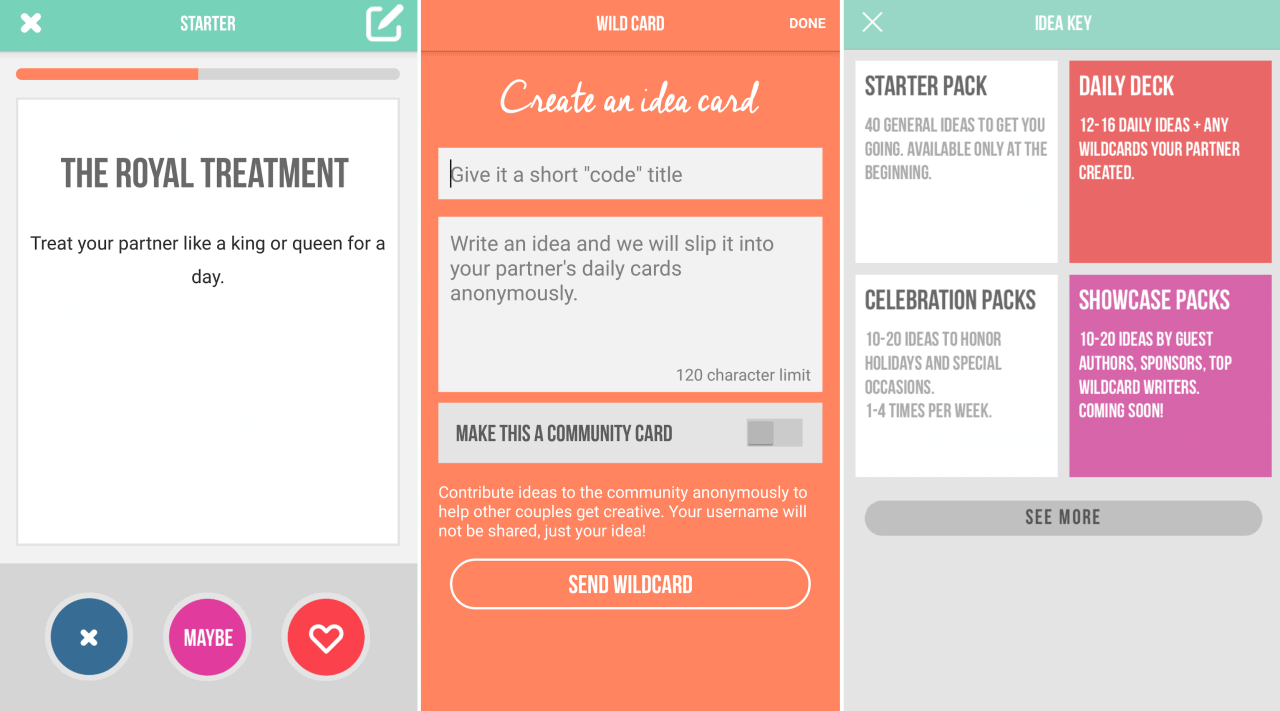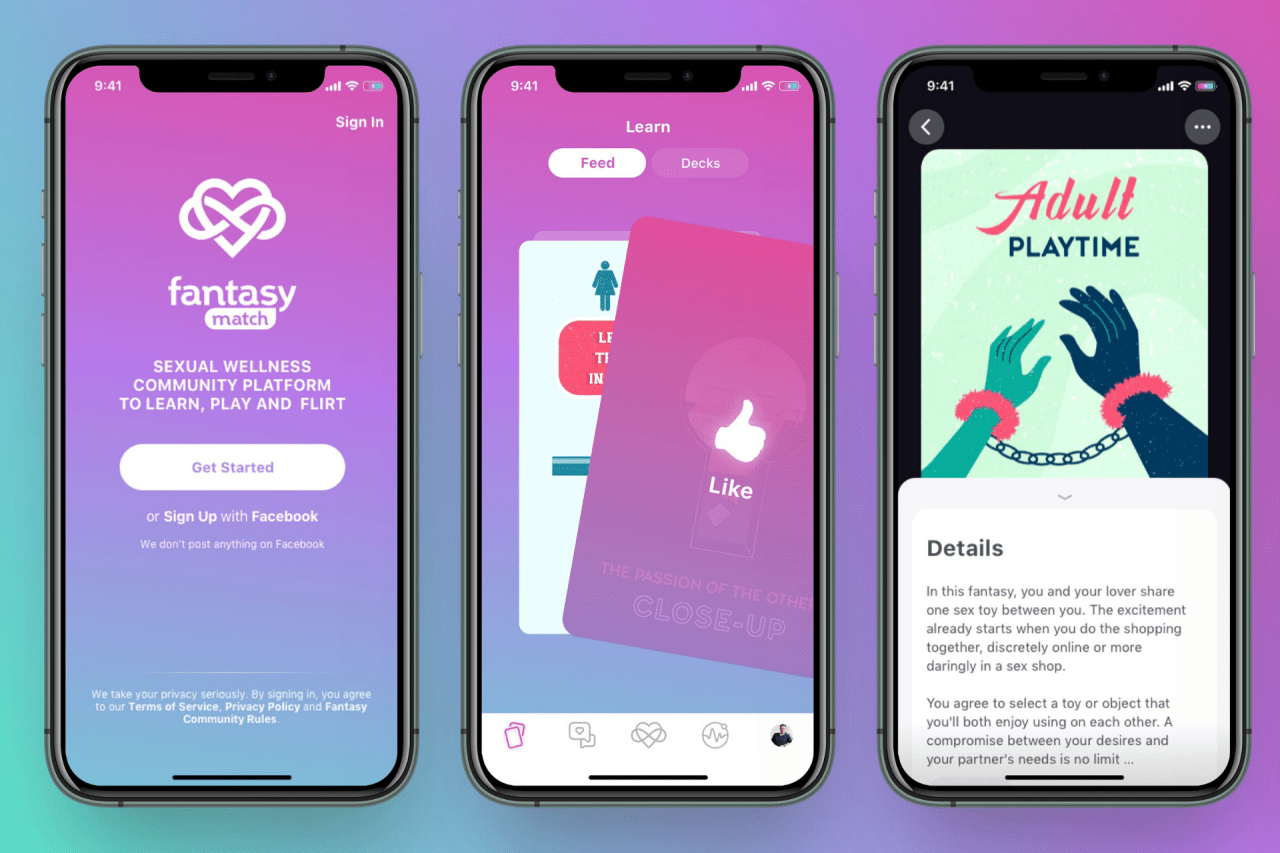How couples apps can help your relationship, and how they really can’t

Whether the romance has dwindled, the bedroom action is feeling a little neglected, or simple communication is lacking, it’s safe to say we could all do with a little relationship help now and again.
Naturally, it’s a role that tech tries to fill – as it does most other aspects of our lives. We spoke to the founders behind the couples apps that aim to use technology as tools for addressing relationship issues, taking into consideration the various dynamics and personal intimacy patterns we display as individuals.
While each is pitched differently, there’s an underlying theme – even if not directly stated – of them filling a role that more traditional professional couples counselling provides, making seeking help financially, physically, or socially more accessible. At least, that’s the theory, though that’s not to suggest they’re a replacement for dedicated couples therapy.
From gamification to edutainment, wellness and emotional intelligence, the various user experiences curate a landscape of apps tailored to your needs – along with timely updates designed for lockdown.
So how do they actually work, and what stopping them from solving all our relationship woes?
[toc]
Circumvent Big Tech's Censorship! Never miss another post!
Subscribe to our notifications!
Article continues below

Couples apps for gamifying sex & edutainment
Barcelona-based gaming app for couples, Desire, launched back in 2015 and is still going strong today. It’s free to download, but has in-app “coins” you can use to unlock challenges. Founder, Pol Gerbeau, told us that he came up with the idea while looking for apps to reignite his marriage.
He was frustrated to only find sex-related apps about the Kamasutra, such as ‘dice-rolling’ and ‘roulette wheels’ for inspiring different sex positions.
“To be honest, all apps were focusing on positions, not on emotions. For me, desire and sex is mainly about the mind. And I thought a game could be a great way to achieve more desire,” Gerbeau told SEXTECHGUIDE.
There are 40,000 dares to challenge your partner with, and for each one you complete, you earn points to reach higher levels. Reach higher levels and then you can send even “spicier dares”.
Similarly, Kindu, offers over 1000 “exciting activities” to try with your partner. These are delivered in daily bite-sized packs.
While its founder, Thomas Nicholas, believes that “embarrassment of our desires can stand in the way of our fulfilment and ultimately our satisfaction”, Kindu’s hypothesis claims that “much of our embarrassment is self-created and that our partners are usually much more open-minded than we expect.” He goes on to say that “Kindu is meant to help get the ball rolling.”
Fantasy Match offers a slightly different user experience. Co-founder, Andrew Yaroshenko, built the app with his partner to highlight the mutual desires people have and to “be an instrument for conversations, foreplay and edutainment”.
As an app built by a couple, for couples, it offers suggestions for introducing more playfulness into your relationship. Sharing packs with various “sensual fantasies”, as well as providing educational content on sexuality, relationships and intimacy.
Couples apps for sexual wellness & emotional intelligence
In tangent to the ‘gamified and edutainment’ arena, some apps signify the importance of sexual wellness in the relationship journey.
Though Lovintel is currently in beta testing, its founder Michael Bogdanov hopes to roll the product out in phases. He shares that “communication is the basis of strong relationships, so is the ability to regulate emotions and understand and successfully fulfil the other partner’s emotional needs.” He is building the app with a focus on emotional intelligence, and is hoping to help people shift their emotional state from fear, anger, or sadness to one of love.
Bogdanov believes that it could also be a great resource to augment the progress of those couples already in therapy.

Additionally, even though the Pillow Talk app shut down in December 2018, its downloadable online practices are still recommended by therapists and counsellors. This consists of 35 audio exercises written and recorded by experts to bring presence and mindfulness to relationships, accessible via the website.
It seems that these tools are beneficial not only as an alternative for therapy, but could be combined as homework for couples in between therapy sessions, or to be continued practice after sessions comes to a close.
Ferly similarly offers intimacy audio guides, though it takes a slightly different approach to sex and relationships. Originally launched to help people on their solo sexual exploration, co-founder Billie Quinlan told SEXTECHGUIDE that despite society’s narrative around sex being something that happens between two or more people, “it’s actually an incredibly personal and solo journey to begin with – or at least it should be.”
Therefore, the app mostly offers audio guides to listen to in private to discover your own body during mindful masturbation practices. However, it currently has two sessions to be enjoyed with a sexual partner called ‘Partnered Play’ and ‘Touch for Touch’. Drawing on learnings from Tantra, these involve exploring each other’s bodies, “encouraging you to disconnect so you can reconnect”.
For couples with kids, this ability to “disconnect” becomes a lot harder. Enter Gilly. Co-founder Erin Chen explains that looking after our relationships is a lot like looking after our physical and mental health, it “takes regular practice!”.
Still in its pre-app beta testing phase, Gilly uses Whatsapp and Messenger to send parenting couples daily treats and exercises to help make prioritizing intimacy and relationship wellbeing “as easy as possible … so that they can just focus on enjoying all aspects of their love and connection,” the company says.
Creating more ‘Love in Lockdown’
Since the global Coronavirus pandemic, the regular routine of our relationships have undoubtedly been shaken up. For better, or worse, couples have been either forced to live in each other’s space (many with kids around 24/7) or apart, adjusting to the unsolicited long-distance.
Despite shutting down in December 2018, Pillow Talk noticed a recent spike in online downloads from the few months during peak lockdown. As one of the first relationship apps to incorporate audio tools for intimacy, its founder Darren Smith told us that “given that we’ve been locked indoors, there of course has been an urge to find new ways to connect, entertain and navigate our relationships.”
Nicholas agrees, but suspects the pandemic is having a “polarizing effect on couples”. He believes that Kindu will help couples who live together “by offering novel suggestions to add more variety to their relationships” as things become repetitive (an important tool for long-term couples generally). Kindu also offers several packs for long-distance couples to connect in different ways.
Even as life finds its new normal, we have been subjected to facing ourselves and our partners in new ways. Kindu is designed “to inspire couples to daydream together” and he thinks that “everyone appreciates a little escapism during these turbulent times.”
Bogdanov says that currently, a lot of people feel stuck, “literally at home and emotionally”, and he believes that his solution will help people to identify and process their emotions in a natural manner. “So, in a sense, the current environment doesn’t call for a change, but rather increases the need for the app.”
Gerbeau highlights that during the quarantine, 30+ new dares were added to the Desire app, for couples that quarantined together (for example, dares while cooking at home), and dares for couples that quarantined apart (dares that involved video-conference).

Over the next few months, Ferly says it’s planning to focus on solo exploration, that will build a more comprehensive partnered journey “to support womxn [term that includes non-cis gender women] to overcome their sexual difficulties whether they are single, casually dating or in a relationship.”
Specifically responding to the current climate, Gilly curated a Love in Lockdown collection of treats to “support couples with kids to come out of this uncertain time stronger, together”. Chen noticed that couples are “looking to experiment with new ways to connect and cope.”
While issues of boredom and neglect are an inherent part of the relationship journey, most of us simply ignore them. The “pandemic paused many of us. We’ve suddenly received much needed time to talk, to share, to express,” says Yaroshenko of Fantasy Match.
The research behind apps for couples
Relationships are a major part of people’s lives, and decisions made can have important ramifications, so the research that goes into these apps is vital, or should be.
Desire took an interesting approach, looking at gender equality on sexual desire and intimacy behaviour to develop its content. In its report, Desire found that out of 253,205 users, sexual desires are very similar between cis women and cis men, “with no significant differences.” The result was not feeling the need to gender its dares.
While Kindu’s research was purely based on anecdotal evidence, Lovintel finds scientific research a key and essential step; taking from various couple therapy and self-help modalities to build the app.
Not only that, but Lovintel has plans to “learn specific patterns and adapt to users’ unique characteristics and preferences over time”, which will be accompanied by ongoing research and analytics. Gilly and Ferly also rely on ongoing and intense research, while also listening to feedback and analyzing data usage as fundamental aspects to evolving its apps.
For Fantasy Match, Yaroshenko and his co-founder and partner, Julia are certified sexologists, and feel strongly about the methods they embed into their app, having tried different scientific models and theories on themselves.
“We continue to deepen our knowledge about relations and sexuality to align with the most advanced studies in this field.”

Additionally, by working with other experts, they recognize that continuous learning is only possible in a community of like-minded people.
The limitations of couples apps
There are obvious benefits to dedicating time and energy on any relationship, whether that’s with the help of an app, or not. For the apps that are designed to help, however, there remain certain limitations.
When we spoke to Pillow Talk’s founder Smith, he noted that a lack of focus ultimately hurt the ability to raise funds.
“We were trying to deal with a product that was for a broad spectrum of people, and in trying to cater to everyone you end up catering for no one,” Smith said. “Every relationship is so unique and so different, each has its own idiosyncrasies, kinks, desires, trauma, all of that is so unique to every individual in the context of every relationship.”
Such a broad focus made the app difficult to market, and investors difficult to attract.
But even when apps do find their niche in the relationship space, barriers within technology and societal taboos continue to hold them back from their audiences.
Though Pillow Talk likely laid the foundations for today’s couples apps, Smith says that his existed too early. He believes that, two years on, society is much more open-minded to sex related apps.
Ferly’s founder claims the biggest challenges are the taboo around female pleasure, sexual difficulties and sexuality in general.
“Those that are already investing in and exploring their sexuality know the importance of it and the impact it has on our health, but those that aren’t part of that conversation struggle to overcome the taboo. We need to break down that barrier so that we can include everyone in a healthy and important dialogue about sexual wellbeing,” Quinlan says.
Gerbeau from Desire agrees that “desire and sex are still a taboo to any big corporation, and we live in 2020! This includes our main distributors (Google and Apple), investors, and any big company that we would like to cooperate with.”
Having been in the industry for five years now, he believes that “things are improving, but we still face a lot of challenges there.”
While stigma inhibits these apps, technical gremlins prevail. Like any app, Kindu has found the normal sort of issues with computer glitches and figuring out coding bugs, whereas Gilly still hasn’t yet managed to finish its standalone app.
“We’ve hit a few roadblocks with developers, which means we haven’t been able to move as quickly as we want,” Chen told us. That said, she credits her team for being “super resourceful and creative in finding ways to continue to improve Gilly for our couples.”
Lovintel, also in beta, acknowledges the importance of utilizing technology to appeal to our modern day shortened attention span and abundance of information.
Relying too heavily on an app to fix a relationships is likely to set us up for failure, yet the effort we put into addressing our issues, whether they’re internal or external, is important.
These apps are potentially useful tools for enhancing our experiences, but they remain just tools, so what you make with them is up to you.
Read Next: VR porn for women always had potential, so what’s holding it back?






